Can celebrity star power illuminate cross-border e-commerce?
In China’s entertainment industry, Fan Bingbing’s name once epitomized top-tier stardom. She graced countless international red carpets and topped Forbes China’s Celebrity Earnings List for five consecutive years. However, the 2018 tax scandal abruptly halted her domestic acting career. Many assumed she would gradually fade from the public eye.
Yet fate had other plans. At 44, Fan Bingbing chose an unconventional path to comeback amid public scrutiny and market skepticism—transitioning from tourism ambassador to film roles, from Xiaohongshu influencer to cross-border e-commerce entrepreneur.
Within a year, her beauty brand Fan Beauty Diary has completed its initial Southeast Asian expansion, launching on Lazada and TikTok while securing placement in Malaysia’s Watsons stores.
Can celebrity star power truly illuminate the blue ocean of cross-border e-commerce? This article traces Fan Bingbing’s journey, alongside case studies of Li Jiaqi and Three Sheep, to dissect the cross-border ventures of celebrities and top live-streamers—and the insights they offer for ordinary cross-border entrepreneurs.
![]()
I. Fan Bingbing’s Southeast Asian Comeback Story
From “Red Carpet Queen” to “Southeast Asian Tourism Ambassador,” Fan Bingbing’s identity shift has been surprising.
1. From Malacca Tourism Ambassador to Honorary “Dato”
In 2024, Fan Bingbing frequently appeared at official events in Thailand and Malaysia. She not only wore traditional Thai attire during the Songkran parade but was also appointed Tourism Ambassador for the state of Malacca.
Local statistics indicate her promotional activities generated over 1.5 billion impressions for Malacca and attracted an additional 450,000 Chinese tourists within a year.
This August, at a Malacca award ceremony, Fan was conferred the honorary title of “Dato’.” For a star whose domestic career faces restrictions, this represents not only recognition of her status but also a new stage.

Source: Sin Chew Daily
2. Returning to the Big Screen
Simultaneously, Fan has explored film collaborations in Southeast Asia. She collaborated with a local Malaysian director on the film Earth Mother, shaving her eyebrows and tanning her skin to portray a peasant woman. This transformation tested both her acting skills and her ability to reinvent her personal image.
From tourism to film, Fan Bingbing has gradually achieved a “soft landing” for her career in Southeast Asia. But what truly brought her back into the public consumption sphere was the rise of Fan Beauty Diary.

Image source: Titanium Media
![]()
II. Fan Beauty’s Cross-Border E-Commerce Experiment
1. The Transformation of Xiaohongshu’s “Queen of Sales”
Fan Bingbing is no stranger to e-commerce. As early as 2017, she frequently shared skincare tips on Xiaohongshu, with recommended products often selling out overnight. At that time, her follower count had already reached tens of millions.
In 2018, she founded Fan Beauty Diary, initially partnering with third-party operators while serving more as a spokesperson. It wasn’t until 2021 that she reclaimed brand control, built her own team, and fully embraced the role of entrepreneur.
From 2021 to 2024, Fan Beauty’s GMV surged from 300 million yuan to 1.45 billion yuan, propelling it to 35th place on China’s Top 100 Beauty Brands list. Leveraging celebrity influence and a mature manufacturing system, the brand achieved explosive growth with minimal R&D burden.

Source: Cyzone, TikTok screenshot
2. Expanding to Lazada, TikTok, and Watsons
In 2023, Fan Bingbing launched Fan Beauty’s international expansion, choosing Lazada as its first platform to enter the Malaysian and Singaporean markets. She wrote on Xiaohongshu: We’re still newcomers, but we’re confident.” Within weeks, Fan Beauty surged to the top of Lazada’s skincare rankings.
The brand then launched on TikTok, with its debut video racking up 670,000 views. However, subsequent video views rapidly declined, revealing the limitations of celebrity influence on Southeast Asian platforms.
The true milestone came in August 2024 when Fan Beauty officially entered Malaysia’s Watsons stores. With over 700 stores in Malaysia, Watsons represents a crucial threshold for beauty brands to establish a foothold.
This shift from online e-commerce to offline retail signaled that Fan Beauty had finally secured its “entry ticket” to the Southeast Asian market.

Source: Titanium Media
3. High-Margin Model and Sustainability Concerns
Fan Beauty’s business model appears flawless: a sheet mask costing less than 2 RMB to produce sells for tens or even dozens of dollars, yielding over 70% gross profit. Leveraging celebrity influence, it requires minimal R&D and marketing investment.
However, concerns remain:
① Celebrity endorsement is irreplicable—can the brand sustain growth without Fan Bingbing’s backing?
② Weak product differentiation—most formulas come from contract manufacturers, making it difficult to establish technological barriers;
③ Pricing is elevated—a $45 average order value far exceeds Southeast Asian consumption levels.
This explains why Fan Beauty’s TikTok follower growth has stalled and its Lazada store momentum is waning.
Celebrity influence can propel a brand to overnight fame, but sustaining long-term viability remains the true test.

Source: Cyzone, TikTok screenshot
![]()
III. Cross-Border E-Commerce 101:
Have You Registered Your Trademark?
Fan Bingbing’s entry into Watsons owes much to her compliance awareness. For cross-border brands, the most overlooked yet critical step is trademark registration.
1. Why Register Trademarks First?
① Brand Protection: Prevent malicious squatting that could block your brand name usage.
Platform Entry Barriers: Platforms like Lazada, Shopee, and TikTok are tightening requirements—opening flagship stores without a trademark is difficult.
Offline Channel Partnerships: Entering retail channels like Watsons and Guardian mandates a trademark.
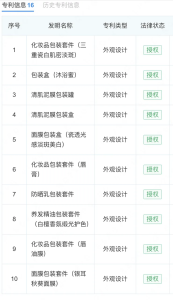
Image/Fan Beauty Trademark, Source: Qichacha
2. Singapore Trademark Application Guide
Using Singapore as an example:
① Submit Application: Complete the application via the Intellectual Property Office of Singapore (IPOS) website, providing brand name and classification details.
② Examination Process: Involves formal examination, substantive examination, and a publication period. The entire process typically takes 6–9 months.
③ Fees: Basic fees start at approximately SGD 240. Additional service fees apply if using an agency.
④ Validity: Once registered, the trademark is valid for 10 years and can be renewed indefinitely.
Many cross-border sellers focus solely on opening stores and running ads when expanding overseas, neglecting trademark protection. Only after building a substantial brand do they discover their name has already been registered by others, forcing them to pay hefty sums for redemption.
For ordinary entrepreneurs, this is the most easily overlooked yet essential “required course” that must be addressed.
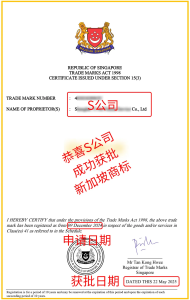
Photo/S Company successfully secures Singapore trademark registration. Unauthorized use of this image will be prosecuted!
![]()
IV. Comparing Li Jiaqi, Three Sheep, and Fan Bingbing
Fan Bingbing isn’t the only top-tier celebrity venturing into cross-border e-commerce. Yet compared to her, the stories of Li Jiaqi and Three Sheep better reveal the industry’s real challenges.
1. Li Jiaqi: Defeat in Indonesia
Li Jiaqi’s team, MeOne, made significant investments in Indonesia—leasing premium office space and building lavish livestream studios. Yet the results were dismal:
Ranked only 86th on TikTok Shop, with monthly GMV under $100,000;
Product selection ignored the needs of Indonesia’s Muslim population;
Local influencers lacked engagement, driving up operational costs.
The failure of China’s top influencer in Southeast Asia proves that replicating domestic models is unworkable.

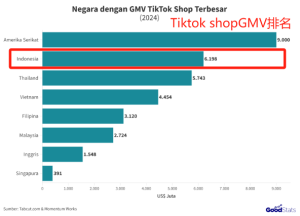
Image source: TikTok screenshot
2. Three Sheep: Cultural Mismatch
Xiao Yangge’s Three Sheep Network initially ranked among the top ten MCNs on TikTok Southeast Asia. Yet within a year, the account ceased updates, with its comment section flooded with negativity. The reason was simple:
Content primarily consisted of reposted domestic videos lacking Indonesian subtitles;
Local audiences perceived it as “sensationalist,” triggering cultural backlash.
This underscores that content localization isn’t optional—it’s essential.

Image source: TikTok screenshot
3. Fan Bingbing: The Other Side of Celebrity Effect
By contrast, Fan Bingbing adopted a smarter approach. Rather than relying solely on livestreaming, she leveraged travel, film, and offline channels to build multidimensional influence.
Yet challenges persist:
Celebrity status attracts attention but doesn’t guarantee sustained sales;
Sluggish TikTok follower growth indicates waning appeal among new-generation consumers.
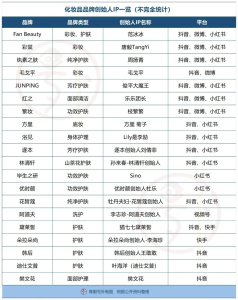
Source: Qingyan Haowai
4. Their contrasting paths reveal cross-border e-commerce’s iron law
Li Jiaqi’s setback reminds us: don’t attempt direct replication of domestic models;
Three Sheep’s predicament shows: content that lacks authenticity is useless, no matter how many followers you have;
Fan Bingbing’s approach serves as a “celebrity case study,” yet it also faces the risk of insufficient product strength.
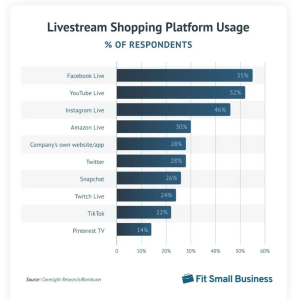
Source: FastMoss Research
Conclusion: The blue ocean of cross-border e-commerce requires celebrities, but even more so, fertile ground
Southeast Asia is hailed as the next $4 trillion consumer market. Population dividends, mobile internet penetration, visa-free policies—everything seems poised to fuel cross-border e-commerce.
Yet the stories of Fan Bingbing, Li Jiaqi, and Three Sheep reveal:
Celebrity aura can spark interest, but cannot sustain long-term engagement;
Cross-border e-commerce isn’t about transferring traffic—it’s a localized entrepreneurial journey starting from scratch;
Trademarks, supply chains, compliance, and localized content are the true lifeblood.
Fan Bingbing’s cross-border experiment may not be replicable, but she demonstrates that even after hitting rock bottom, one can rebuild a career on new ground.
For all cross-border e-commerce entrepreneurs, celebrity influence is merely the opening chapter. The enduring narrative is always written by market forces and the brand’s own strength.
Note: References sourced from: Qichacha, Titan Media, Cyzone, 36Kr, Lazada, TikTok, Qingyan Haowai, Sin Chew Daily, FastMoss Research, and compiled from comprehensive news reports. Reproduction requires attribution; contact for removal if infringing….
